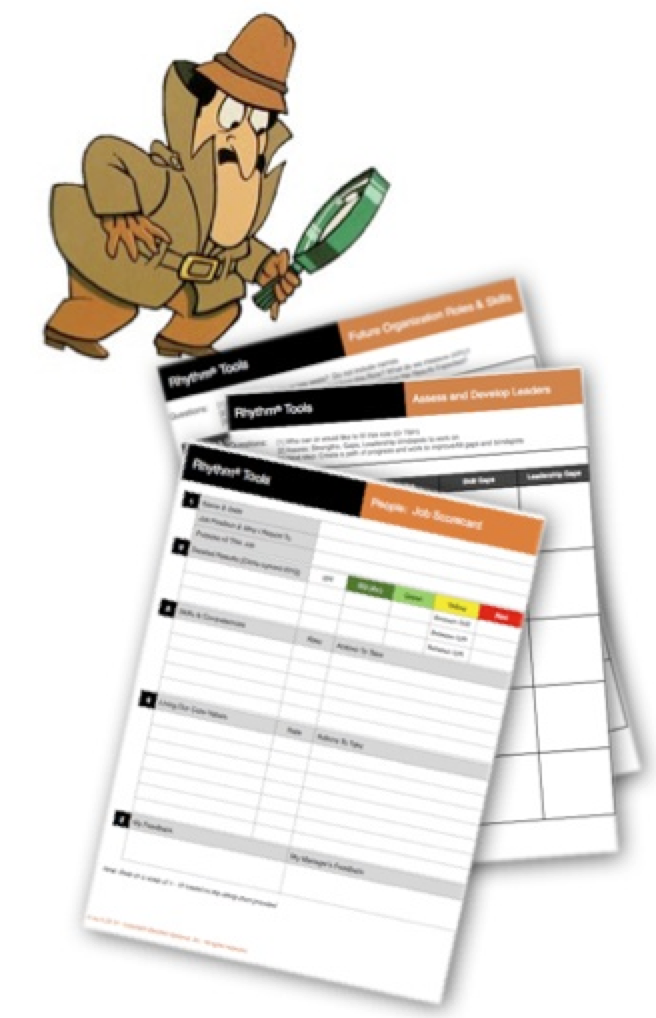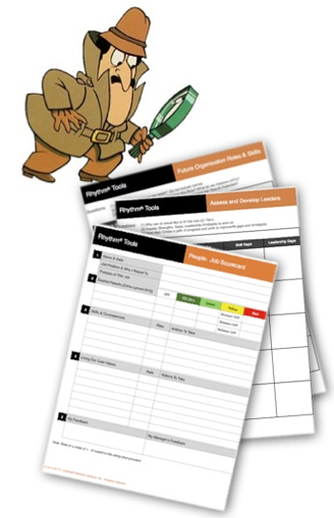I had dinner tonight, a murder mystery dinner, and in the middle of the excitement found myself reminiscing on the successful, and failed, leaders that I’ve met over many years of coaching. At top of mind were the best detectives—masters at uncovering details, piecing the clues together, developing a hypothesis of the correct answer, somehow instinctively testing the hypothesis, with the winner stepping up as a sort of a whodunit expert. It was interesting to see similar patterns at the dinner. Out of ten dinner tables (teams) and 80 guests (team members), only one table came to the right answer of who the murderer was, and that person’s motive(s). I find this holds true for the average company where only 1 in 10 leadership teams prove capable of finding the right answer. Gazelle-like companies do much better than that, and you can too, by following the clues left behind by successful, fast growing companies.
Having seen many clues and patterns that have led to success or failure of leaders, and the identification of whodunit in the murder of their business, I sometimes say to myself, “I’ve seen this movie before.” Perhaps it’s a new setting, or new characters, but, I’ve seen this movie before, and I know the ending. The ending we strive for as leaders is one where everyone stays until the credits have rolled, the crowd stands in uproarious ovation, and then leaves talking about how well the plot played out. Every scene was perfect. Each actor knew his or her part. The sound effects were realistic. Pauses were perfect. The room was aglow. That’s one reason why we choose to lead.
So don’t settle for a bit part in your own major Hollywood murder mystery production. Don’t ever let the murder of your business (or career) be your unsolved mystery. Instead, be the lead detective. Capture and organize the clues—then carefully examine the plot, characters, and scene to determine how you win this year’s business Oscar. If you need help getting the right team in place for your Oscar, watch this Webcast.
The murder mystery clue most often missing for average companies and leaders is the definition of Core Values Clue #1. This is a handful of guiding principles or enduring tenets that, when left undefined, murder everything that you strive for in business. Core Values require no external justification, and they should not be chosen from a list or something you gleaned from some other business or industry. Each should have intrinsic value and great importance to those inside your team or company. The clue to determining if you’ve got the right values is whether you are prepared to hire or fire based on each. Go no further in gathering clues until you complete this. Stop now and consider whether any core values that you’ve stated are verbally repeatable by your team. Try the hallway test. If they can’t tell you the values in the hallway, then they aren’t used enough in your conversation for the team to believe they are core. If you fail to correct this core value and understand and use it, then your business murder will no longer be a mystery.
Assuming your Core Values are in place and practiced, let me share a clue usually overlooked by the typical business detective. Clue #2 thinks all problems are execution problems when some are people problems. When you misdiagnose business problems, you waste time and resources and squander an intangible called morale. Sometimes, your team doesn’t have the skills that they need, and sometimes, they don’t have the leadership that inspires them to achieve the necessary goals. Let’s examine three master detective tools to keep you from misdiagnosis and your business off the murder mystery menu.
Detective Tool #1: Future Organization Roles and Skills Tool
Completing this tool will offer clues on whether you are adequately staffed for the right roles in the future. Carefully examine the roles and skills required to connect with your organization's future. It will help you think about your roles, the results, and the skills needed to reach those results. Discussing this document with your senior leaders may reveal additional insights and clues. One common discovery is that current senior team members are confident that they are qualified for future roles–yet CEOs sometimes know that they are not. This leads us to ask two questions: 1) is the CEO right? and 2) Can the person develop the skills for the job?
No matter how you approach this issue, remember that many team members will automatically feel threatened by creating their future roles and skills unless you make it safe. You can make it safe by focusing on the roles and skills rather than the person.
Finally, consider these helpful tips when working through this tool with your team: don’t stop the input… write it down, keep it a safe environment, be open, and listen without judgment.
Detective Tool #2: Tool to Assess and Develop Leaders
Completion of this tool will offer a baseline for personal development plans or, as we call them, Path of Progress (POP). This document is often completed only by a department leader or CEO. You’ll think through three steps: 1) Who are the internal candidates who could fill this role? (Gaps indicate a future hiring need.) 2) You will assess their strengths, skills, and leadership abilities to develop then. 3) Develop a Path of Progress and growth/work needed to improve/fill gaps.
Detective Tool #3 Job Scorecard
Notice that this tool is named a Job Scorecard, not a person scorecard. The objective of discovering these clues is to provide clear goals, expectations, and feedback for each team member so that they can significantly multiply their contribution to the company and to their own success.
In completing the Job Scorecard, you’ll be guided through thinking about the purpose of this job (why this position exists, the overall purpose within the organization), desired results (visible and measurable evidence that the responsibilities are being met, the purpose is being fulfilled), skills and competencies (the specific traits necessary for success in this role), key responsibilities (particular actions or tasks required to fulfill this role’s purpose), and living core values (behavior demonstrating an understanding of and alignment with your stated core values).
The two clues and three tools above will lead you to the correct hypothesis–a fast-growing company. With Core Values in place, the proper diagnosis of people versus execution issues, the consistent use of the Future Roles and Skills Tool, the Tool to Assess and Develop Leaders, and the Job Scorecard, you’ll be like a great detective. You’ll read the right clues and have the proper tools to make better decisions–perhaps the right decisions, and certainly NOT emotional ones. Our experience with clients is that fast-growth companies do this, and average companies don’t so get to work, master detective, and write to me with your results.




